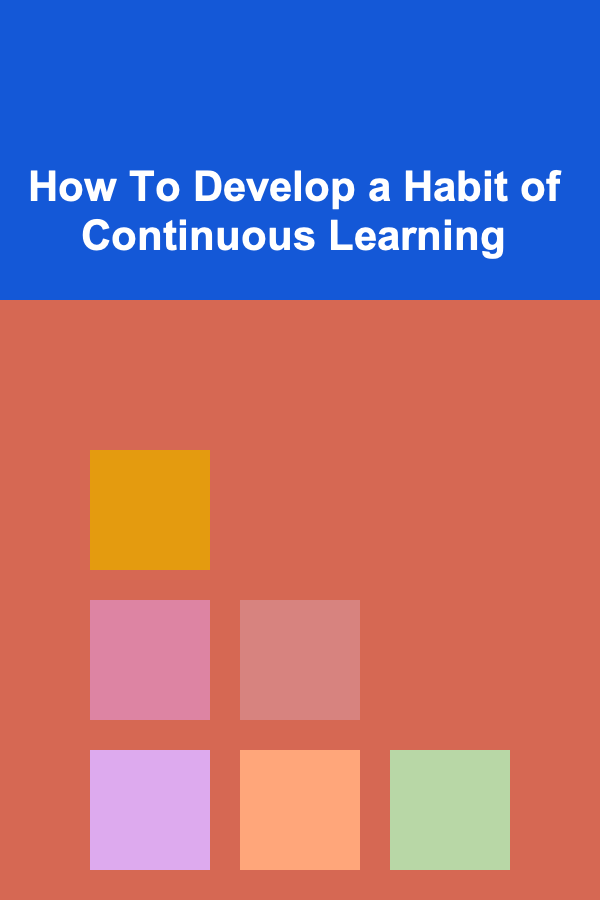
How To Develop a Habit of Continuous Learning
ebook include PDF & Audio bundle (Micro Guide)
$12.99$9.99
Limited Time Offer! Order within the next:

Continuous learning is one of the cornerstones of personal and professional growth. In today's fast-paced world, where technological advances and societal changes happen at an unprecedented rate, the ability to continuously learn and adapt is essential for success. Developing a habit of continuous learning not only allows individuals to keep pace with change but also enables them to unlock new opportunities, enhance their skills, and stay competitive in their fields. However, adopting a mindset of lifelong learning is not always easy, especially when distractions, time constraints, and self-doubt come into play. This article explores practical strategies for cultivating the habit of continuous learning and making it an integral part of your life.
The Importance of Continuous Learning
Before diving into how to develop a habit of continuous learning, it's important to understand why it matters. In our rapidly evolving world, staying relevant requires more than just knowledge acquisition --- it requires the ability to continuously update and expand that knowledge. Here are some compelling reasons why continuous learning is vital:
1. Adapting to Change
Change is inevitable, particularly in the context of technological advancements. Automation, artificial intelligence, and machine learning are reshaping industries, and to thrive in such an environment, it is essential to stay informed. Continuous learning helps you anticipate change and adapt to new trends, ensuring that your skills remain relevant and valuable.
2. Improving Problem-Solving Skills
The more knowledge and skills you acquire, the better equipped you are to solve problems. Continuous learning fosters intellectual flexibility, creativity, and a broad understanding of diverse fields. With each new concept or technique you learn, you can apply it to your life or career in unexpected ways, making you a more effective problem solver.
3. Boosting Confidence and Self-Esteem
Acquiring new knowledge or mastering new skills boosts your self-confidence and sense of accomplishment. This positive reinforcement motivates you to learn more and continue challenging yourself. Over time, this builds a resilient mindset, where you feel more capable and confident in your abilities.
4. Opening Up New Opportunities
Continuous learning also opens up new professional and personal opportunities. By consistently improving your skills and knowledge, you can position yourself for promotions, new career paths, or even entrepreneurship. Moreover, continuous learning broadens your horizons, exposing you to new interests, hobbies, or communities that you may not have considered before.
5. Maintaining Mental Agility
Learning is not just about acquiring facts; it's about stimulating your brain and maintaining cognitive function. Engaging in activities that challenge the brain helps to maintain mental agility and prevent cognitive decline as you age. Research suggests that lifelong learning can delay or prevent conditions like Alzheimer's disease and other forms of dementia.
The Challenges of Continuous Learning
While continuous learning is undoubtedly beneficial, it comes with its own set of challenges. The key to success is overcoming these obstacles, which often involve self-doubt, time management issues, and distractions. Here are some common challenges:
1. Lack of Time
Many individuals cite lack of time as the primary barrier to learning. Between work, family, and other obligations, it can be difficult to prioritize learning. However, as we will discuss later, learning doesn't have to take up large chunks of time. Small, consistent efforts can accumulate into significant progress over time.
2. Procrastination
Procrastination can also impede progress in learning. People often delay starting because the task feels overwhelming or because they don't know where to begin. Overcoming procrastination requires creating a structured learning plan and setting realistic goals.
3. Self-Doubt
Self-doubt is a common challenge when embarking on any new learning journey. Many people question whether they are capable of mastering a new skill or concept, especially if it feels outside their comfort zone. This can lead to avoidance or a lack of effort. Overcoming self-doubt requires a shift in mindset, which we will explore further.
4. Information Overload
With so many resources available, it can be difficult to know where to start or what information to trust. The abundance of options can be overwhelming, leading to paralysis by analysis. Being selective about resources and focusing on high-quality, actionable content is crucial for overcoming this challenge.
How to Develop the Habit of Continuous Learning
Now that we understand the importance of continuous learning and the challenges associated with it, let's explore strategies to help you develop a sustainable habit of learning. The following steps can guide you in making learning an ongoing and integral part of your life.
1. Establish a Learning Mindset
The foundation of continuous learning is cultivating a learning mindset. This involves being open to new ideas, seeking growth, and viewing challenges as opportunities to expand your knowledge. A learning mindset encourages curiosity, resilience, and a positive attitude toward failure.
- Embrace mistakes: See failure as part of the learning process rather than something to be avoided.
- Be curious: Ask questions and seek to understand the world around you.
- Stay humble: Understand that there is always more to learn, and no matter how much you know, there is always room for growth.
2. Set Clear Learning Goals
Setting clear, actionable goals helps to focus your learning efforts and provides a sense of direction. Whether you are learning a new language, skill, or concept, defining specific objectives gives you something tangible to work toward. Your goals should be:
- Specific: Define exactly what you want to learn.
- Measurable: Set criteria to measure your progress.
- Achievable: Make sure your goals are realistic within your time and resources.
- Relevant: Ensure your learning objectives align with your personal or professional aspirations.
- Time-bound: Set deadlines for achieving your goals.
By setting clear goals, you can track your progress and stay motivated.
3. Create a Structured Learning Plan
A structured plan will prevent you from feeling overwhelmed and help you stay organized. Break down your learning goals into smaller, manageable tasks. For example, if you want to learn a new programming language, start by mastering the basics before moving on to more advanced topics. Plan your learning schedule and allocate specific time slots during the week to focus on your goals.
4. Make Learning a Daily Habit
Consistency is key when it comes to developing the habit of continuous learning. Instead of trying to cram all your learning into one or two sessions, aim to engage in learning every day, even if it's only for 15--30 minutes. This can involve reading an article, listening to a podcast, watching a tutorial, or practicing a new skill.
The more you make learning a daily habit, the easier it becomes to integrate it into your lifestyle. Over time, you will find that learning becomes second nature and an enjoyable part of your routine.
5. Leverage Multiple Learning Sources
To avoid stagnation and keep your learning experience engaging, it's important to vary the sources of your learning. Here are a few ways you can diversify:
- Books and Articles: Reading remains one of the best ways to acquire new knowledge.
- Online Courses: Platforms like Coursera, Udemy, and edX offer countless opportunities to learn new skills at your own pace.
- Podcasts and Audiobooks: If you have a busy schedule, listen to educational podcasts or audiobooks during commutes or workouts.
- Workshops and Seminars: Participate in live events to learn from experts in your field.
- Mentorship: Seek guidance from those who are experienced in areas you want to learn about.
By diversifying your learning methods, you can stay motivated and engaged, while also deepening your understanding of different topics.
6. Create a Learning Environment
Your environment plays a significant role in shaping your learning habits. Create a dedicated space for learning where you can focus without distractions. This could be a corner in your home, a library, or even a quiet café. Ensure that your space is comfortable, well-lit, and stocked with the necessary materials.
In addition to a physical space, cultivate a mental environment conducive to learning by surrounding yourself with like-minded individuals who share your passion for growth. Join study groups, online communities, or professional organizations where you can discuss ideas and share knowledge.
7. Track Your Progress and Reflect
As you work toward your learning goals, it's important to track your progress and reflect on what you've learned. Regular reflection helps solidify new information and allows you to assess whether you need to adjust your learning approach. You can keep a learning journal to document key takeaways, challenges you faced, and new skills acquired.
Tracking progress also provides motivation, as you can look back and see how far you've come. Recognizing milestones, no matter how small, can fuel your desire to continue learning.
8. Overcome Self-Doubt and Perfectionism
It's natural to experience self-doubt when learning something new, but it's essential not to let it hold you back. Recognize that everyone starts somewhere and that learning is a gradual process. Mistakes are a normal part of this journey.
Similarly, avoid the trap of perfectionism, which can prevent you from taking action. You don't need to master everything in one go. Focus on progress, not perfection. By embracing the process and being patient with yourself, you'll cultivate a more sustainable and enjoyable learning habit.
9. Celebrate Your Successes
Finally, take the time to celebrate your learning milestones. Acknowledge your achievements, whether it's mastering a new skill, completing a course, or reaching a particular learning goal. Celebrating success reinforces the positive aspects of learning and provides an extra incentive to keep going.
Conclusion
Developing a habit of continuous learning is a powerful tool for personal and professional growth. By cultivating a learning mindset, setting clear goals, creating a structured plan, and engaging in daily learning, you can make continuous learning an integral part of your life. Despite the challenges that may arise, overcoming obstacles and staying consistent will allow you to reap the benefits of lifelong learning --- from increased confidence and career opportunities to improved problem-solving skills and mental agility.
Remember, learning is a journey, not a destination. Embrace the process, stay curious, and make continuous learning a priority. The world is constantly changing, and with the habit of lifelong learning, you can ensure that you are always evolving alongside it.
Reading More From Our Other Websites
- [Home Security 101] How to Choose Lorex Security Cameras for Optimal Home Security Coverage
- [Home Renovating 101] How to Maximize Your Kitchen Renovation Budget by Choosing the Right Countertop Material Alternatives
- [Personal Care Tips 101] How to Choose Between Sugar Scrubs and Salt Scrubs for Exfoliation
- [Home Maintenance 101] How to Regularly Inspect Your Home Appliances
- [Personal Investment 101] How to Evaluate Cryptocurrency Projects Before You Invest
- [Home Renovating 101] How to Renovate a Bathroom on a Tight Budget: A Step-by-Step Guide
- [Home Renovating 101] How to Update Your Home's Lighting for a Modern Look
- [Home Staging 101] How to Stage Your Home's Bedrooms for Ultimate Relaxation Appeal
- [Home Cleaning 101] How to Teach Kids About Cleaning Responsibilities
- [Home Holiday Decoration 101] How to Design Unique and Personalized Holiday Gift Tags That Wow

How to Choose the Right Flooring for Pet Areas
Read More
How to Use a Label Maker for Streamlined Organization
Read More
How to Use Pinterest Effectively for Wedding Inspiration
Read More
How to Use Adobe Illustrator for Vector Art: A Comprehensive Guide
Read More
How to Organize Your Holiday Gift Shopping List (and Stick to It!)
Read More
10 Tips for Preventing Gum Disease in Pregnant Women
Read MoreOther Products

How to Choose the Right Flooring for Pet Areas
Read More
How to Use a Label Maker for Streamlined Organization
Read More
How to Use Pinterest Effectively for Wedding Inspiration
Read More
How to Use Adobe Illustrator for Vector Art: A Comprehensive Guide
Read More
How to Organize Your Holiday Gift Shopping List (and Stick to It!)
Read More